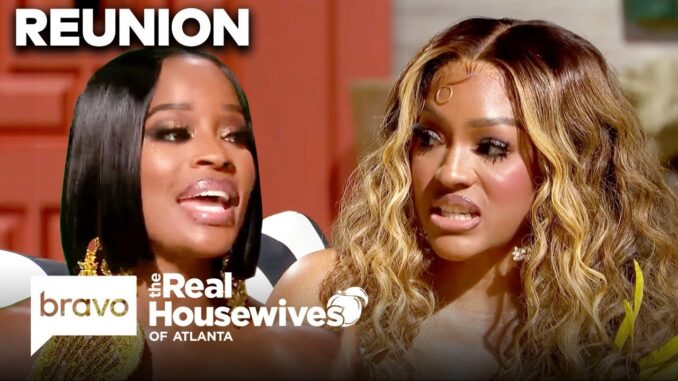
Friendship or Survival: Drew Weighs In on Shamea and Porsha
The vibrant, often volatile, landscape of reality television offers a surprisingly fertile ground for examining fundamental human dilemmas. Stripped of the pretense of everyday life, relationships are distilled into their rawest forms under the crucible of public scrutiny, revealing the fragile tapestry of trust, loyalty, and self-preservation. When Drew Sidora, a voice often eager to articulate moral codes, weighed in on the complex dynamic between Shamea Morton and Porsha Williams, she inadvertently illuminated a timeless question: where does the ideal of friendship end and the imperative of survival begin?
At its heart, friendship is often held as a sacrosanct bond, an unwritten covenant built on shared history, mutual support, and unwavering loyalty. We expect our friends to be our confidantes, our cheerleaders, and our unwavering allies, especially when the world turns hostile. This idealized vision dictates that a true friend would never intentionally inflict harm, betray a trust, or actively participate in actions that cause their friend pain. It is a relationship predicated on choice, a voluntary commitment to another's well-being and happiness, often above one's own immediate gain.
This ideal was precisely what seemed to unravel in the much-discussed drama between Shamea and Porsha. For years, their bond had been presented as one of sisterhood, navigating the choppy waters of public life together. Yet, when Porsha embarked on a relationship with Simon Guobadia, the ex-husband of Shamea’s friend and a man deeply entangled in their social circle, the lines of that sacred covenant blurred into an illegible scrawl. For Shamea, Porsha’s new romance felt like a profound betrayal, a disregard for their shared history and for the unwritten rules of their social contract. It wasn't just about Porsha finding love; it was about the manner, the perceived insensitivity, and the public nature of a decision that seemed to prioritize personal desire over the feelings of a long-standing friend.
Drew Sidora, often positioned as a truth-teller or moral compass within the RHOA ecosystem, stepped into this breach with a clear, unequivocal stance. Her commentary echoed the collective sentiment of many who observed the unfolding saga: true friends simply do not do that. She articulated the common understanding of loyalty, emphasizing that a friend should protect, not wound; uphold, not undermine. Drew’s intervention wasn't merely gossip; it was a pronouncement on the very definition of friendship, a reassertion of its non-negotiable tenets. She highlighted the perceived lack of empathy and the shocking disregard for Shamea’s feelings, framing Porsha's actions not as an individual choice, but as a violation of a universally understood friendship code.
However, the reality of life, particularly life lived in the public eye, often introduces a more complex, insidious element: survival. Not survival in the primal sense of food and shelter, but social survival – the navigation of power dynamics, the pursuit of opportunity, the maintenance of relevance, and the often ruthless prioritization of self-interest. In the cutthroat world of reality television, where narratives are currency and alliances are fluid, the lines between genuine connection and strategic maneuvering can become hopelessly blurred. Did Porsha's actions stem purely from romantic impulse, or were they, in part, a strategic move – a shocking narrative pivot, a calculated step to secure a new chapter of visibility and personal gain? In this context, "survival" might mean securing a storyline, maintaining a certain lifestyle, or seizing an opportunity that trumps older loyalties.
This introduces a harrowing question: is there a point where the demands of personal advancement or social positioning outweigh the duties of friendship? Is it a betrayal, or merely a different set of rules for a different game? For some, the answer is a pragmatic, if cold, "yes." In a world where personal brands and financial independence are paramount, relationships can sometimes become transactional, evaluated for their utility rather than their inherent value. Porsha, a seasoned veteran of the reality TV landscape, understands the mechanics of this game intimately. Her choices, while painful to Shamea and condemned by Drew, might be viewed through a lens of self-preservation in a highly competitive environment.
Ultimately, Drew Sidora's strong opinion on the Shamea and Porsha dynamic did more than just fuel a reality TV feud; it served as an illustrative commentary on a perennial human struggle. It forced viewers to confront the uncomfortable tension between the idealized notion of unconditional friendship and the undeniable human instinct for survival – both personal and social. While we may yearn for the purity of unwavering loyalty, the messy realities of life, ambition, and shifting circumstances often reveal that even the most enduring friendships can be tested, and sometimes broken, when faced with the irresistible pull of perceived opportunity or the intricate dance of social maneuvering. The episode reminds us that the lines defining friendship are not always as clear as we wish them to be, especially when survival, in its many nuanced forms, enters the frame.